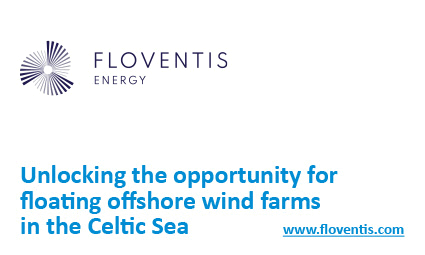The Celtic Sea Developer Alliance has expressed its disappointment that no contracts have been awarded to floating offshore wind (FLOW) projects in the latest round (AR5) of the UK Government’s renewable auction.
This includes Erebus, Wales’s pioneering planned floating offshore wind farm, which received the necessary environmental consents earlier this year.
The Celtic Sea has the potential to deliver 24GW of renewable energy through floating offshore wind turbines, and Wales has the potential to be a global player, but without support and backing from UK Government, the CSDA believes we are at risk of falling behind.
These projects are vital to meet the UK Government’s 5GW floating offshore wind target by 2030, and today is a huge blow to these ambitions and efforts to reach Net Zero.
In the UK, the Committee on Climate Change states offshore wind will become the ‘backbone’ of the future energy system, requiring 100GW of installed capacity by 2050. Floating Offshore Wind (FLOW) is set to deliver 50% of that target.
The development of the sector has huge potential to drive regional development, new supply chain opportunities, thousands of high-skilled jobs and support the energy transition towards Net Zero, but this potential has not been realised.
Tom Hill, Marine Energy Wales Programme Manager and Chair of the Celtic Sea Developer Alliance expressed his disappointment at today’s announcement:
“The news is deeply worrying for the sector. The UK Government is not providing the confidence for investment that this industry desperately needs.
“Unless the CfD process is reformed to move away from a focus on competition for the lowest electron, the supply chain in Wales and the UK will be disadvantaged, particularly at this stage, where developments are in their infancy.
“The absence of offshore wind developers on the list of contract winners is also a huge blow for Wales and Welsh Government Net Zero ambitions. The fact that the Erebus project could now be delayed will have tremendous knock-on-effects on Welsh supply chain, ports and send the wrong message to the world.”
On behalf of its members, the CSDA is calling for:
- The Crown Estate, Welsh Government and UK Government to clearly signal the scale and pipeline for FLOW within the Celtic Sea to inspire market confidence and attract the appropriate level of investment.
- Investment in port infrastructure to develop the capabilities required to deliver FLOW and secure existing and attract new local supply chains, stimulating economic growth.
- A Regional Development Strategy – The Celtic and North Seas are both developing FLOW but at different stages. It is essential to balance government support and ensure both regions have development opportunities and the chance to maximise supply chain benefits.
- Upgraded Grid capacity – There is currently no grid capacity available to deliver the existing 4GW seabed leasing or anything beyond this. Electricity System Operator (ESO), National Grid and Ofgem must urgently recognise this requirement and invest in increasing grid capacity and improving infrastructure.
- Cross border collaboration between Ireland and the UK – Governments in Wales and Ireland are already collaborating to identify strategic work areas to support FLOW and maximise socio-economic impacts. UK Government should also be supporting cross-border collaboration.







